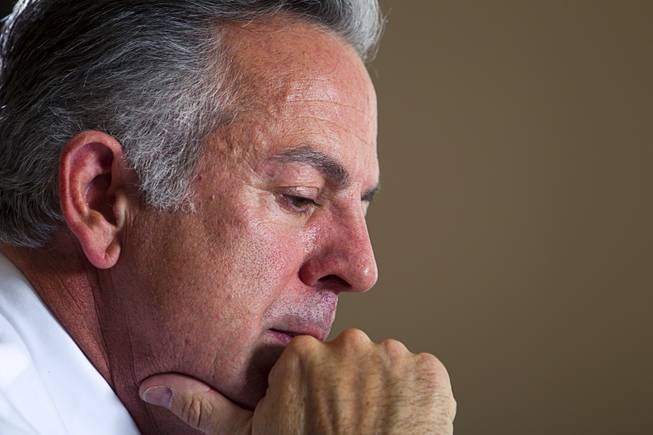
Clark County Sheriff Joe Lombardo considers a question during a meeting with Las Vegas Sun reporters and editors Tuesday, March 24, 2015, at Las Vegas Metro Police headquarters.
Friday, March 27, 2015 | 2 a.m.
It’s been almost a year since anti-government extremists went on a shooting rampage in northeast Las Vegas, gunning down a good Samaritan and a pair of Metro Police officers in broad daylight.
Officials still don’t know why Jerad and Amanda Miller did it, but the attack has since drawn concerns from local police about the threat of so-called "domestic terrorists."
“I wish I could put myself in the mind of those individuals,” Sheriff Joe Lombardo said, noting that a recently disclosed FBI analysis didn’t offer any new clues on a motive. “We haven’t been able to identify a key component that caused them to act the way they did.”
Sovereign citizens
The Millers were loosely aligned with the views of Bunkerville cattle rancher Cliven Bundy’s so-called “sovereign citizen” movement — a law-defying group fueled in part by religion, anti-government and sometimes racist beliefs.
There are clues that Jerad Miller — who had joined a militia challenging federal officials on Bundy’s ranch — was an aspiring terrorist. In a video posted online, he said he “want(ed) to be a war mongerer” and “blow up whole nations.” He was deemed unpredictable by the group that gathered on the ranch and he was ordered to leave. Months later, the Millers staged the mass shooting.
Yet nine months later, local and federal investigators have been unable to fully understand the Millers’ apparent hatred for government figures.
Domestic terrorism
Amid the morphing threat of the Islamic State and America’s stepped-up military strikes on the Middle East, the public’s interest in counterterrorism efforts has been renewed in recent months. But officials in Las Vegas are less concerned with the possibility of an attack from overseas terrorist groups than the potential uprise of so-called domestic terrorists.
“My bigger concern is the lone wolf, the person here locally that is disgruntled with government, separatist anarchist, those types of individuals,” Lombardo said. “They act on their own, versus international terrorists.”
Lombardo isn't alone in his concern, as suggested in an October report from the National Consortium for the Study of Terrorism and Responses to Terrorism.
"First, law enforcement perceptions about what is a serious threat in their community has changed significantly over time," the report said. "Law enforcement is much more concerned about sovereign citizens, Islamic extremists, and militia/patriot group members compared to the fringe groups of the far right, including Christian Identity believers, reconstructed traditionalists (i.e., Odinists), idiosyncratic sectarians (i.e., survivalists), and members of doomsday cults. In fact, sovereign citizens were the top concern of law enforcement ..."
While the jihadist group ISIS is a powerful organization that now controls key territory overseas, the United States is not under significantly higher threat, said Victor Asal, a political science professor at the University at Albany-SUNY who specializes on international relations.
“ISIS has its hands full at the moment,” Asal said. “Like several other organizations, it clearly presents a threat. But I don’t think that threat to the American homeland is significantly higher today compared with three months ago.”
Balancing act
Still, the Las Vegas Strip is an American landmark, and local officials are wary of potential attacks from international terrorism groups.
Las Vegas has been talked about as a potential terrorist target since law enforcement leaders reported the 9/11 hijackers visited the city several times before attacking the World Trade Center and Pentagon. And officials play a delicate balancing act when they handle that threat. Two vague references to Las Vegas from those groups late last year showed how police work to share information with the public without needlessly rousing fear.
Last September, Metro issued a statement responding to an online post by ISIS sympathizers that listed the Strip as a potential target. The department said it had not spotted any specific plans to carry out an attack on the Strip.
But Metro doesn’t publicly address every threat. For example, it didn’t respond when a new English-language al-Qaida magazine featured a guide for making car bombs and suggested Las Vegas casinos as targets.
Capt. Christopher Jones, who oversees the department’s counterterrorism operations, says police don’t want to desensitize the public.
“You can only cry wolf so many times,” Jones said in an interview after the September announcement. “If you continually do that and continually increase your threat posture every time a little bit of chatter comes through ... it’s going to become white noise to the public.”
Federal funding
Lombardo says Metro is getting a boost in funding this year to fight terrorism threats. For the first time last year Las Vegas failed to get Homeland Security funding as one of the 25 metro areas most at-risk of terrorism activity. Now it’s being added back to the list.
Last fiscal year, Metro received just over $1 million in funding from the feds — down by nearly half compared with the year before. The sheriff said his agency should get more money this year, though it’s not yet clear how much.

Join the Discussion:
Check this out for a full explanation of our conversion to the LiveFyre commenting system and instructions on how to sign up for an account.
Full comments policy